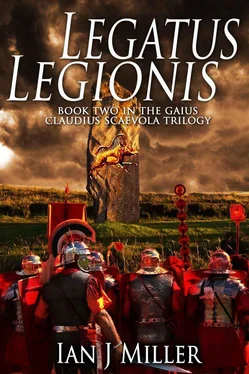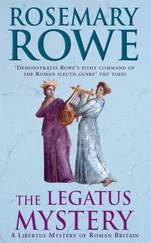Ian Miller - Legatus Legionis
Здесь есть возможность читать онлайн «Ian Miller - Legatus Legionis» весь текст электронной книги совершенно бесплатно (целиком полную версию без сокращений). В некоторых случаях можно слушать аудио, скачать через торрент в формате fb2 и присутствует краткое содержание. Жанр: Исторические приключения, на английском языке. Описание произведения, (предисловие) а так же отзывы посетителей доступны на портале библиотеки ЛибКат.
- Название:Legatus Legionis
- Автор:
- Жанр:
- Год:неизвестен
- ISBN:нет данных
- Рейтинг книги:3 / 5. Голосов: 1
-
Избранное:Добавить в избранное
- Отзывы:
-
Ваша оценка:
- 60
- 1
- 2
- 3
- 4
- 5
Legatus Legionis: краткое содержание, описание и аннотация
Предлагаем к чтению аннотацию, описание, краткое содержание или предисловие (зависит от того, что написал сам автор книги «Legatus Legionis»). Если вы не нашли необходимую информацию о книге — напишите в комментариях, мы постараемся отыскать её.
Legatus Legionis — читать онлайн бесплатно полную книгу (весь текст) целиком
Ниже представлен текст книги, разбитый по страницам. Система сохранения места последней прочитанной страницы, позволяет с удобством читать онлайн бесплатно книгу «Legatus Legionis», без необходимости каждый раз заново искать на чём Вы остановились. Поставьте закладку, и сможете в любой момент перейти на страницу, на которой закончили чтение.
Интервал:
Закладка:
He thanked the assembled men for their loyalty and their devotion to duty, he announced that in the brief time he had been with them they had performed admirably and he wished them well for the future. His last order was to require them to march to their base in Egypt and give the same degree of loyalty to their new Legate. He saluted them, then he handed formal authority to the Tribunus Laticlavius .
At this moment it was customary for the men to give a cheer; they did, several times, and while his sore head was not prepared for it, he stood to attention and he formally saluted them all. He stepped back and then the orders for the first cohort to march were given. Gaius then walked over to and climbed a small stand beside the path to be used by the men as they left the fortification so that he could salute them, cohort by cohort, as they marched past to begin the march to Egypt.
As they marched, his mind drifted back to the prophecy he had received at the temple of Athene. There was something odd about this prophecy. Athene had promised her prophecy would be validated by a discussion on contraries and it had been. Or had it? Was it the existence of the prophecy that made him follow it? Was the making of the prophecy such that it became self-fulfilling? If that were the case, was the prophecy really a message? Was Athene, whoever she was, pushing him into doing something that otherwise he would not? The more he thought about this, the more he suspected it was true, but if it were true, who or what was Athene?
He saluted again, as the next cohort began to pass. They were good men, but they were also a killing machine. Fortunately, it had not been necessary to use them as such, and that brought his mind back to the prophecy.
The issue of the temple had come to pass, but that was not self-fulfilling. Caesar had ordered a statue of himself to be placed in the Temple of Jerusalem, and to save extraordinary bloodshed, he had to persuade Caesar to change his mind. Athene had prophesied that he would lead the most loyal of legions, that he would deny Athene, yet claim to be following her. All of this had inspired his letter to Little Boots, and according to Claudius, this letter had made a very favourable impression. Athene had said he would deny another God, yet his request for help from that God was essential. He had turned his back on Christianity, but he had asked the Christian Rebecca to pray to her God to change Caesar's mind, and Caesar had changed his mind. How could his request to a God he did not believe in have any effect? It could be nothing but a coincidence, but whatever it was, it was not self-fulfilling! The act of thinking about the prophecy might have made him do things he may not have done otherwise, but the act of making the prophecy could not have affected Caesar's actions because Caesar was unaware of it. So, maybe this prophecy was a message from the Gods, or from something, for the fact was, he did not really believe in the Gods. The Gods were simply lumps of stone that represented some of mankind's worst aspects.
Not that it made much sense in other ways. How could a dream tell what would happen in the future? It was just plain impossible, except it had happened. There were to be two women in his life. The first, the most beautiful of all, he would ignore. The second, the ugliest of all, he would scoff at. So far he had met neither, although it was possible he had met the first and ignored her totally. But if so, how could she have a critical part in his life?
Then there were the two strangest prophecies: he would make a revolutionary discovery that was critical to understanding physics, and he would make a revolutionary engine that would eliminate the need for slavery. Then the peculiar addition: neither would change anything in his lifetime, but both were critical to his achieving success and averting some terrible disaster. How could that be? Then he was promised military success, he would win major battles and earn a triumph.
So far, prospects were not good. He believed he had been successful in command, but of the major incidents so far, only one had been a battle, and two he had resolved through diplomacy. Possibly it was more bluff and luck than diplomacy, but nevertheless. . If he summed up where he had got to, he no longer had a military position; apart from his interpretation of contraries he had made no real progress on physics, while his engine was going nowhere quickly. Perhaps the one redeeming feature of his current situation was that while he had been with the Cyrenaica he had been far too busy to worry about either physics or engines; now he would have a lot of spare time.
His thoughts on physics were going nowhere, although to be fair, that was mainly because he had not really thought about it at all. Athene had required him to correct Aristotle's physics, and the correction would allow him to prove that the Earth was a planet that travelled around the sun. That seemed impossible, as shown by the fact that Timothy, his erstwhile teacher and now his friend, had provided proofs that the Earth was stationary and was not orbiting anything.
If his prophecy were real and not a dream, then the implication was that Athene knew the answer, and that Aristotle was wrong. Yet Timothy had provided proofs through physical observation that the Earth had to be stationary. Aristotle, the greatest mind ever, originally obtained these proofs and Aristotle would not be wrong, would he? According to Athene, Aristotle was wrong and if she were a Goddess, she should know. But if she were not a Goddess, then her knowing did not follow, unless. . Unless what? Then there was the problem that, if she were a Goddess, why was she trying to persuade him to do. . to do what? She had sent him on a mission, and from the way she told him in the dream, it was almost as if she did not know how to complete it either. Then there was her attitude; it was as if she needed him to succeed far more than he did.
So, assuming Aristotle was really wrong, what could he do? He could get around some of Aristotle's arguments, but Aristotle's physics had provided one point that seemed insurmountable: orbiting, or travelling in a circle, required continual force to change the direction. That force would have to be provided by the sun, and because the sun was always the same size, the Earth was always the same distance from it. That meant the Earth had to travel in a circle, which required the Earth to be continually falling towards the sun. Since heavier things fall faster than light things, the Earth should fall to pieces but it did not.
To make matters worse, it seemed quite obvious that the Earth was not moving. Suppose you were in a cart or chariot, and were being pulled by horses in full flight. Now, when the cart turned a corner, you tended to be flung against the side of the cart, or even worse, you could fall off the cart. Yet for the Earth to orbit, a continual force was required, the Earth would always be turning, and it would be travelling at speeds that made the fastest horses seem like somnolent snails. The problem was, people did not fall over or fall against walls, except when they were drunk.
That task was hopeless, which was why he had ignored it. Thinking about it was simply a waste of time, and added to which, as Timothy pointed out, even if he could falsify Aristotle's reasoning that did not mean that the Earth moved; it merely meant that Aristotle's reasoning was wrong. The problem was simple: to prove that Aristarchus was correct he had to find some observation that applied only if the Earth moved, for as Aristotle had pointed out, in logic there may be many hypotheses that could explain a fact, and such a fact did not prove any given hypothesis unless it were the only possible hypothesis.
One thing he was sure of was that movement had to be with respect to something else. Yes, there was the Sun, but that was no help. Even if you could prove the sun was not rotating and you could see the other side half the time, there was no way of telling it was the other side! Consequently, there was no way to prove the Earth moved around the sun. Except that whoever or whatever it was that called herself Pallas Athene said that he would. Well, if it were that important, she could have left a clue! She had a reason for why she hadn't too: she had said whether the Earth moved was unimportant; what was important was the method by which he proved that it moved.
Читать дальшеИнтервал:
Закладка:
Похожие книги на «Legatus Legionis»
Представляем Вашему вниманию похожие книги на «Legatus Legionis» списком для выбора. Мы отобрали схожую по названию и смыслу литературу в надежде предоставить читателям больше вариантов отыскать новые, интересные, ещё непрочитанные произведения.
Обсуждение, отзывы о книге «Legatus Legionis» и просто собственные мнения читателей. Оставьте ваши комментарии, напишите, что Вы думаете о произведении, его смысле или главных героях. Укажите что конкретно понравилось, а что нет, и почему Вы так считаете.












